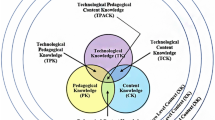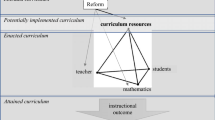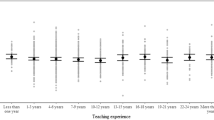Abstract
Standardised curriculum or standardized lesson plans (SLPs) have become an accepted strategy to support and improve instructional practices in schools worldwide. These standardised lesson plans (SLPs) were criticized in the 1970s and 1980s for deskilling the teaching profession and reducing the work of teachers to that of mere technicians. This critique is now returning at a time of growing regulation of teachers’ work in many school systems. In this paper, we investigate the potential and limitations of the SLPs which are the main component of the Gauteng Primary Language and Mathematics Strategy (GPLMS), a large-scale multipronged instructional reform established in Gauteng, the most industrialised province of South Africa around Johannesburg and Pretoria. Our interest is to engage with the impact of SLPs on teachers, given the frequent claims that teacher autonomy is seriously eroded and threatened by SLPs. We examine the relationship between autonomy and authority, by drawing on the philosophers Peters and Winch as well as on curriculum theorists Remillard, Morris and Hiebert who have studied standardized curriculum materials and their impact on teachers’ work. The paper argues for a deeper analytical understanding of teacher autonomy and offers three conditions that can equip teachers to seize “autonomy opportunities” when working with SLPs: (1) standardised curriculum materials of high quality, sufficiently specified so that correct and incorrect ways of following the content and procedures inscribed in the SLPs and the reasons for them are accessible to all teachers; (2) authority which is considered legitimate, applied in a morally justified manner and managed in an educationally sound way; and (3) appropriate use of professional and personal knowledge, when making decisions and evaluating SLPs’ prescriptions in context. In the rest of the paper we evaluate the “autonomy opportunities” provided by the GPLMS standardised lesson plans, by examining whether the three conditions were met.
Similar content being viewed by others
Notes
See the argument of Fullan (2016) on the advantages of specificity for low skill and low knowledge teachers.
References
Apple, M. W. (1982). Curriculum and the labor process: The logic of technical control. Social Text, 5, 108–125.
Apple, M. W. (2000). Official knowledge. London: Routledge.
Barbash, S. (2012). Clear teaching: With direct instruction, Siegfried Engelmann discovered a better way of teaching. Education Consumers Foundation. http://education-consumers.org/pdf/CT_111811.pdf. Accessed March 3, 2016.
Beatty, B. (2011). The dilemma of scripted instruction: Comparing teacher autonomy, fidelity, and resistance in the Froebelian kindergarten, Montessori, Direct Instruction, and Success for All. Teachers College Record, 113(3), 395–430.
Ben-Peretz, M. (1990). The teacher-curriculum encounter: Freeing teachers from the tyranny of texts. Albany: Suny Press.
Bereiter, C., & Englemann, S. (1966). Teaching disadvantaged children in the preschool. Englewood Cliffs: Prentice-Hall.
Brown, M. B. (2009). Teacher—Tool relationship: Theorizing the design and use of curriculum materials. In J. Remillard, B. Herbel-Eisenmann, & G. Lloyd (Eds.), Mathematics teachers at work: Connecting curriculum materials and classroom Instruction. New York: Routledge.
Brown, M., & Edelson, B. (2003). Teaching as design: Can we better understand the ways in which teachers use materials so we can better design materials to support their changes in practice? LeTUS report series. Evanston: The centre for learning technologies in urban schools. http://www.inquirium.net/people/matt/teaching_as_design-Final.pdf. Accessed November 9, 2016.
Bryk, A. S. (2009). Support a science of performance improvement. Phi Delta Kappan, 90, 597–600.
Davis, E. A., & Krajcik, J. (2005). Designing educative curriculum materials to promote teacher learning. Educational Researcher, 34(3), 3–14.
De Clercq, F. (2014). Improving teacher practices in poorly performing primary schools: The trial of the Gauteng Primary Language Strategy. Education as Change, 18(2), 303–318.
De Clercq, F., & Shalem, Y. (2014). Teacher knowledge and employer-driven professional development: A critical analysis of the Gauteng Department of Education programmes. Southern African Review of Education, 20(1), 129–147.
Elmore, R. F. (2016). ‘‘Getting to scale…’’ it seemed like a good idea. Journal of Educational Change, 17, 527–537.
Even, R., & Tirosh, D. (1995). Subject-matter knowledge and knowledge about students as sources of teacher presentations of the subject-matter. Educational Studies in Mathematics, 29, 1–20.
Fleisch, B. (2016). System-wide improvement at the instructional core: Changing reading teaching in South Africa. Journal of Educational Change, 17, 437–451.
Fleisch, B., & Schöer, V. (2014). Large-scale instructional reform in the Global South: Insights from the mid-point evaluation of the Gauteng Primary Language and Mathematics Strategy. South African Journal of Education, 34(3), 1–12.
Fullan, M. (2016). The elusive nature of whole system improvement in education. Journal of Educational Change, 17, 539–544.
Giroux, H. (2010). Teachers as transformative intellectuals. In K. Ryan & J. M. Cooper (Eds.), Kaleidoscope: Contemporary and Classic Readings in Education (pp. 35–40). Belmont, CA: Wadsworth, Cengage Learning.
Hargreaves, A. (2000). Four ages of professionalism and professional learning. Teachers and Teaching: History and Practice, 6(2), 151–182.
Hiebert, J., & Morris, A. K. (2012). Teaching, rather than teachers, as a path toward improving classroom instruction. Journal of Teacher Education, 63(2), 92–102.
Janks, H. (2014). Globalisation, diversity, and education: A South African perspective. The Educational Forum, 78(1), 8–25.
Kim, T., & Axelrod, S. (2005). Direct instruction: An educators’ guide and a plea for action. The Behavior Analyst Today, 6(2), 111–120.
Morris, A. K., & Hiebert, J. (2011). Creating shared instructional product: An alternative approach to improving teaching. Educational Researcher, 40(1), 5–14.
Msibi, T., & Mchunu, S. (2013). The knot of curriculum and teacher professionalism in post-apartheid South Africa. Education as Change, 17(1), 19–35.
NEEDU. (2013). National Report 2012: The state of literacy teaching and learning in the Foundation Phase. Pretoria: Department of Basic Education.
Peters, R. (1973). Authority, responsibility and education (3rd ed.). London: George Allen & Unwin.
Reeves, J. (2010). Teacher learning by script. Language Teaching Research, 14(3), 241–258.
Remillard, J. T. (2005). Examining key concepts in research on teachers’ use of mathematics curricula. Review of Educational Research, 75(2), 211–246.
Remillard, J. T. (2009). Part II commentary: Considering what we know about the relationship between teachers and curriculum materials. In J. T. Remillard, B. A. Herbel-Eisenmann, & G. M. Lloyd (Eds.), Mathematics teachers at work: Connecting curriculum materials and classroom instruction (pp. 85–92). New York: Routledge.
Robertson, S. L. (1996). Teachers’ work, restructuring and postfordism: constructing the new ‘professionalism’. In I. F. Goodson & A. Hargreaves (Eds.), Teachers’ professional lives. London: Falmer Press.
Schneider, R. M., Krajcik, J., & Marx, R. (2000). The role of educative curriculum materials in reforming science education. In B. Fishman & S. O’Connor-Divelbiss (Eds.), Fourth international conference of the learning sciences (pp. 54–61). Mahwah, NJ: Erlbaum.
Shalem, Y., & Slonimsky, Y. (2010). The concept of teaching. In Y. Shalem & S. Pendlebury (Eds.), Retrieving teaching: Critical issues in curriculum, pedagogy and learning. Juta: Cape Town.
Shalem, Y., Steinberg, C., Koornhof, H., & De Clercq, F. (2016). The what and how in scripted lesson plans: The case of the Gauteng Primary Language and Mathematics Strategy. Journal of Education, 66, 1–24.
Slonimsky, L. (2016). Teacher change in a changing moral order: Learning from Durkheim. Education as Change, 20(2), 27–43.
Steutel, J., & Spiecker, B. (2000). Authority in educational relationships. Journal of Moral Education, 29(3), 323–337.
Winch, C. (2002). Strong autonomy and education. Educational Theory, 52(1), 27–41.
Winch, C. (2010). Dimensions of expertise: A conceptual exploration of vocational knowledge. New York: Continuum.
Winch, C., & Gingell, J. (2008). Philosophy of education: The key concepts (2nd ed.). London: Routledge.
Acknowledgement
Funding was provided by ZENEX FOUNDATION (Grant No. REQ NO. 77006).
Author information
Authors and Affiliations
Corresponding author
Rights and permissions
About this article
Cite this article
Shalem, Y., De Clercq, F., Steinberg, C. et al. Teacher autonomy in times of standardised lesson plans: The case of a Primary School Language and Mathematics Intervention in South Africa. J Educ Change 19, 205–222 (2018). https://doi.org/10.1007/s10833-018-9318-3
Published:
Issue Date:
DOI: https://doi.org/10.1007/s10833-018-9318-3




